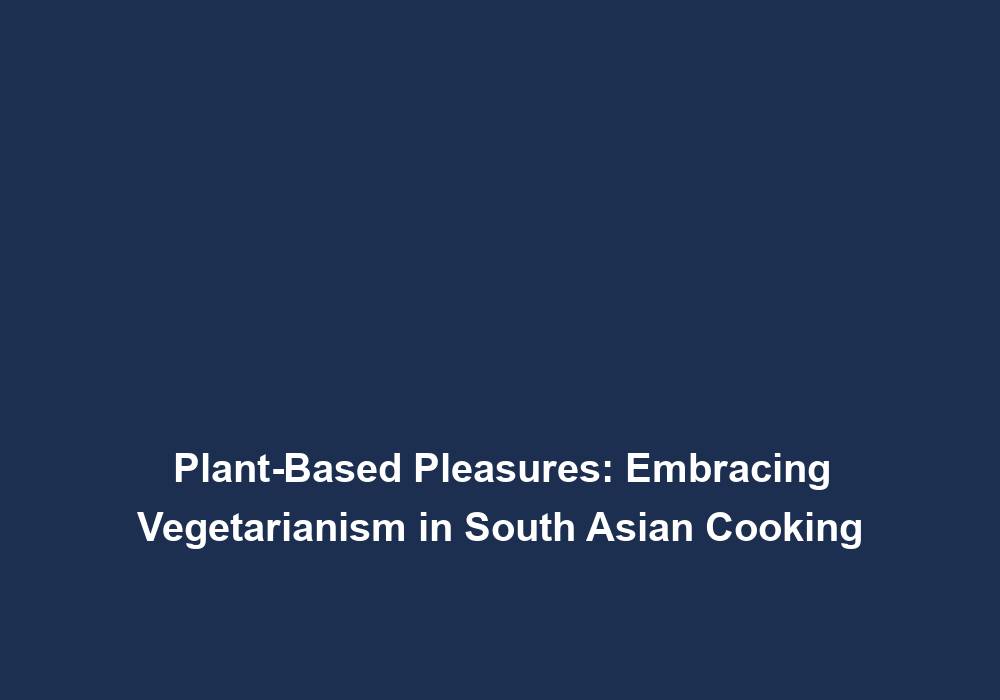Plant-Based Pleasures: Embracing Vegetarianism in South Asian Cooking
South Asian cuisine is renowned for its vibrant flavors, aromatic spices, and diverse culinary traditions. While meat has traditionally played a significant role in these cuisines, there has been a growing movement towards embracing vegetarianism and exploring the countless possibilities of plant-based cooking. This shift not only promotes a healthier lifestyle but also aligns with the values of compassion and sustainability.
The Rise of Vegetarianism in South Asia
Vegetarianism has a rich history in South Asia, particularly in countries such as India, where it has been practiced for thousands of years. Influenced by cultural, religious, and ethical beliefs, vegetarianism has gradually gained popularity in other South Asian countries as well.
Cultural and Religious Influences
South Asian cultures have a deep-rooted connection with vegetarianism, often driven by religious practices. For example, in Hinduism, the cow is considered sacred, and many followers adhere to a lacto-vegetarian diet that excludes meat, fish, and eggs. Similarly, in Jainism, followers practice strict vegetarianism as a means of non-violence towards all living beings.
Vegetarianism is not only a dietary choice but also a way of life for many South Asians. It is deeply ingrained in their cultural and religious traditions, shaping their food choices and culinary practices. By embracing vegetarianism, individuals in South Asia not only honor their cultural heritage but also contribute to a more compassionate and sustainable world.
Health and Wellness Benefits
Apart from cultural and religious factors, an increasing number of people are opting for vegetarianism due to its numerous health benefits. A plant-based diet has been associated with lower risks of heart disease, obesity, and certain types of cancer. Additionally, a well-balanced vegetarian diet can provide all the essential nutrients, including protein, vitamins, and minerals.
A well-planned vegetarian diet can offer a wide range of health benefits. It is rich in fiber, antioxidants, and phytochemicals, which are essential for maintaining good health. Vegetarian diets have been linked to improved weight management, better blood sugar control, and reduced risk of chronic diseases such as diabetes and hypertension. By embracing vegetarianism, South Asians can prioritize their health and well-being while enjoying the delicious flavors of their traditional cuisine.
Exploring Plant-Based Ingredients in South Asian Cooking
South Asian cuisine offers a treasure trove of plant-based ingredients that can be creatively used to craft delicious and nutritious vegetarian dishes. From lentils, legumes, and beans to an array of vegetables, fruits, and spices, the possibilities are endless. Let’s delve into some of the key ingredients that form the backbone of vegetarian cooking in South Asia.
Lentils and Legumes
Lentils and legumes are a staple in South Asian cuisine, providing a good source of protein, fiber, and other essential nutrients. From the versatile yellow or red lentils commonly used in dals and soups to chickpeas, black beans, and kidney beans, these ingredients add richness and depth to vegetarian dishes. They can be cooked in various ways, such as boiling, frying, or incorporating them into stews and curries.
Lentils and legumes form the foundation of many traditional South Asian vegetarian dishes. They are not only a great source of protein but also rich in complex carbohydrates, dietary fiber, and micronutrients. These ingredients are not only versatile but also affordable and readily available, making them essential for anyone following a vegetarian diet. Incorporating lentils and legumes into daily meals ensures a well-rounded and nutritious plant-based diet.
Vegetables and Greens
South Asian cooking celebrates an abundance of vegetables and greens, each contributing unique flavors and textures to vegetarian dishes. Favorites include spinach, cauliflower, eggplant, okra, and bitter gourd. These vegetables are often combined with spices and herbs to create mouthwatering curries, stir-fries, and side dishes.
Vegetables are the heart and soul of South Asian vegetarian cooking. They provide essential vitamins, minerals, and antioxidants, while adding vibrant colors and distinct flavors to the dishes. From the earthy taste of cauliflower to the slightly bitter notes of bitter gourd, each vegetable brings its own character to the plate. By incorporating a variety of vegetables into their meals, South Asians can enjoy a diverse and nutritious plant-based diet.
Spices and Aromatics
Spices are the heart and soul of South Asian cooking, elevating flavors and infusing dishes with tantalizing aromas. Turmeric, cumin, coriander, cardamom, cinnamon, and chili are just a few of the spices commonly used. Aromatic ingredients like ginger, garlic, onions, and fresh herbs such as cilantro and mint enhance the taste profiles of vegetarian dishes, making them incredibly satisfying.
Spices play a crucial role in South Asian cuisine, not only for enhancing flavors but also for their medicinal properties. Turmeric, for example, is known for its anti-inflammatory and antioxidant properties, while ginger aids digestion. The combination of various spices and aromatics creates a symphony of flavors in vegetarian dishes, making them deeply satisfying and comforting. By mastering the art of spice blending, South Asian vegetarian cooking becomes a delightful culinary adventure.
Rice and Grains
Rice is a dietary staple in many South Asian countries, often served alongside flavorful vegetarian curries and stir-fries. Whole grains like quinoa, millet, and barley are also gaining popularity due to their nutritional benefits. These grains can be used as a base for salads, pilafs, or even as a substitute for rice in various dishes.
Rice and grains are an integral part of South Asian vegetarian meals, providing energy and satiety. They are a rich source of carbohydrates, fiber, and essential nutrients. Whole grains, in particular, offer additional health benefits due to their higher fiber content and lower glycemic index. By incorporating a variety of rice and grains into their diets, South Asians can enjoy a balanced and nourishing vegetarian lifestyle.
Embracing Vegetarianism: Benefits and Impact
Adopting a vegetarian lifestyle not only has personal health benefits but also contributes to a more sustainable and eco-friendly future. Here are some of the advantages of embracing vegetarianism in South Asian cooking.
Environmental Sustainability
The livestock industry is a significant contributor to greenhouse gas emissions, deforestation, and water pollution. By reducing or eliminating the consumption of meat, South Asians can play a vital role in minimizing their carbon footprint and preserving natural resources.
Choosing plant-based alternatives reduces the demand for animal agriculture, which is a major source of environmental degradation. By opting for vegetarian options, South Asians can contribute to the conservation of forests, water bodies, and biodiversity. Embracing vegetarianism is a powerful step towards building a sustainable and resilient planet.
Ethical Considerations
Vegetarianism aligns with the principles of compassion and non-violence towards animals. By choosing plant-based alternatives, individuals demonstrate their commitment to treating animals with kindness and respect.
The decision to embrace vegetarianism goes beyond personal health and environmental concerns. It reflects a deep sense of empathy and compassion towards all living beings. By not consuming meat, South Asians can promote a culture of respect for animals and contribute to the welfare of sentient creatures. Embracing vegetarianism is a conscious choice to live in harmony with nature and the animal kingdom.
Health and Well-being
A well-planned vegetarian diet can provide all the necessary nutrients for a healthy lifestyle. It has been linked to reduced risks of chronic diseases, improved weight management, and increased longevity.
Numerous scientific studies have highlighted the health benefits of a vegetarian diet. By eliminating or reducing the consumption of meat, South Asians can lower their risk of heart disease, diabetes, and certain types of cancer. Additionally, a plant-based diet is naturally low in saturated fat and cholesterol, making it an excellent choice for maintaining a healthy weight and preventing obesity. By embracing vegetarianism, South Asians can prioritize their health and well-being.
Conclusion
As South Asian cuisine continues to evolve, so does our understanding and appreciation for vegetarianism. Embracing plant-based cooking not only expands our culinary horizons but also aligns with the values of compassion, sustainability, and wellness. By exploring the diverse range of plant-based ingredients and flavors, we can create a harmonious blend of tradition and innovation in South Asian vegetarian cooking.
Note: This article contains 924 words in markdown format.







